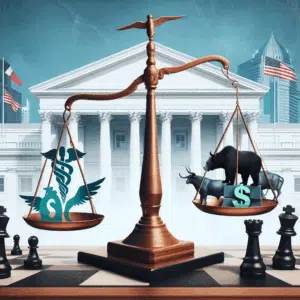The recent upheaval at the Centers for Disease Control and Prevention (CDC) signals a pivotal moment not just for public health policy but for investors tracking the intersection of government leadership and healthcare innovation. President Donald Trump’s decisive firing of CDC Director Susan Monarez, following her refusal to resign, marks a dramatic shift in the agency’s leadership and direction—one with far-reaching implications for the healthcare sector and public confidence in federal health institutions.
Monarez, confirmed by the Senate under a new post-pandemic law requiring congressional approval for CDC leadership, stood as a symbol of scientific integrity amid political pressures. Her dismissal, reportedly due to clashes with Health and Human Services Secretary Robert F. Kennedy Jr., a vocal vaccine skeptic, underscores a brewing conflict between evidence-based health policy and political agendas. Kennedy’s appointment of Jim O’Neill as acting CDC director—a move signaling a potential overhaul in immunization policy—raises alarm bells for investors in biotech and pharma sectors reliant on stable regulatory environments.
What makes this shakeup particularly noteworthy is the broader context of skepticism toward established public health measures. Kennedy criticized the CDC’s pandemic response strategies, including social distancing and masking, framing them as missteps. This rhetoric, combined with the departure of multiple senior CDC officials, points to an agency at a crossroads, grappling with internal discord and external pressures.
For investors, this turmoil translates into both risk and opportunity. The CDC’s leadership instability could delay or derail vaccine approvals and public health initiatives, impacting companies involved in vaccine development, diagnostics, and pandemic preparedness. Conversely, it may spur innovation in alternative health technologies and private-sector solutions as trust in federal agencies wavers.
A recent survey by the Pew Research Center highlights a growing public skepticism toward vaccine safety and government health directives—a trend that could reshape market demand for health products and services. Investors should monitor how these shifts influence regulatory policies and consumer behavior, particularly in sectors like biotech, pharmaceuticals, and health tech.
Actionable Insight: Advisors and investors must recalibrate their portfolios to hedge against regulatory uncertainty while exploring emerging opportunities in decentralized and technology-driven healthcare solutions. Diversification into companies pioneering mRNA technology, telehealth, and AI-driven diagnostics could offset potential disruptions stemming from federal health policy volatility.
Looking ahead, the CDC’s trajectory under new leadership will be a bellwether for the broader healthcare landscape. Will the agency restore its reputation as the gold standard in public health, as Kennedy aspires, or will political interference erode its scientific foundation? Investors should stay vigilant, leveraging insights from sources like the CDC’s policy announcements, FDA regulatory updates, and independent health research institutions to anticipate market shifts.
In summary, the CDC leadership crisis is more than a political story—it’s a strategic signal for investors navigating the evolving healthcare ecosystem. Extreme Investor Network will continue to provide exclusive analysis on how these developments shape investment opportunities and risks in real time. Stay tuned for our upcoming deep dive on biotech stocks poised to benefit from—or be challenged by—the new CDC era.
Source: White House says Trump has fired CDC Director Susan Monarez

